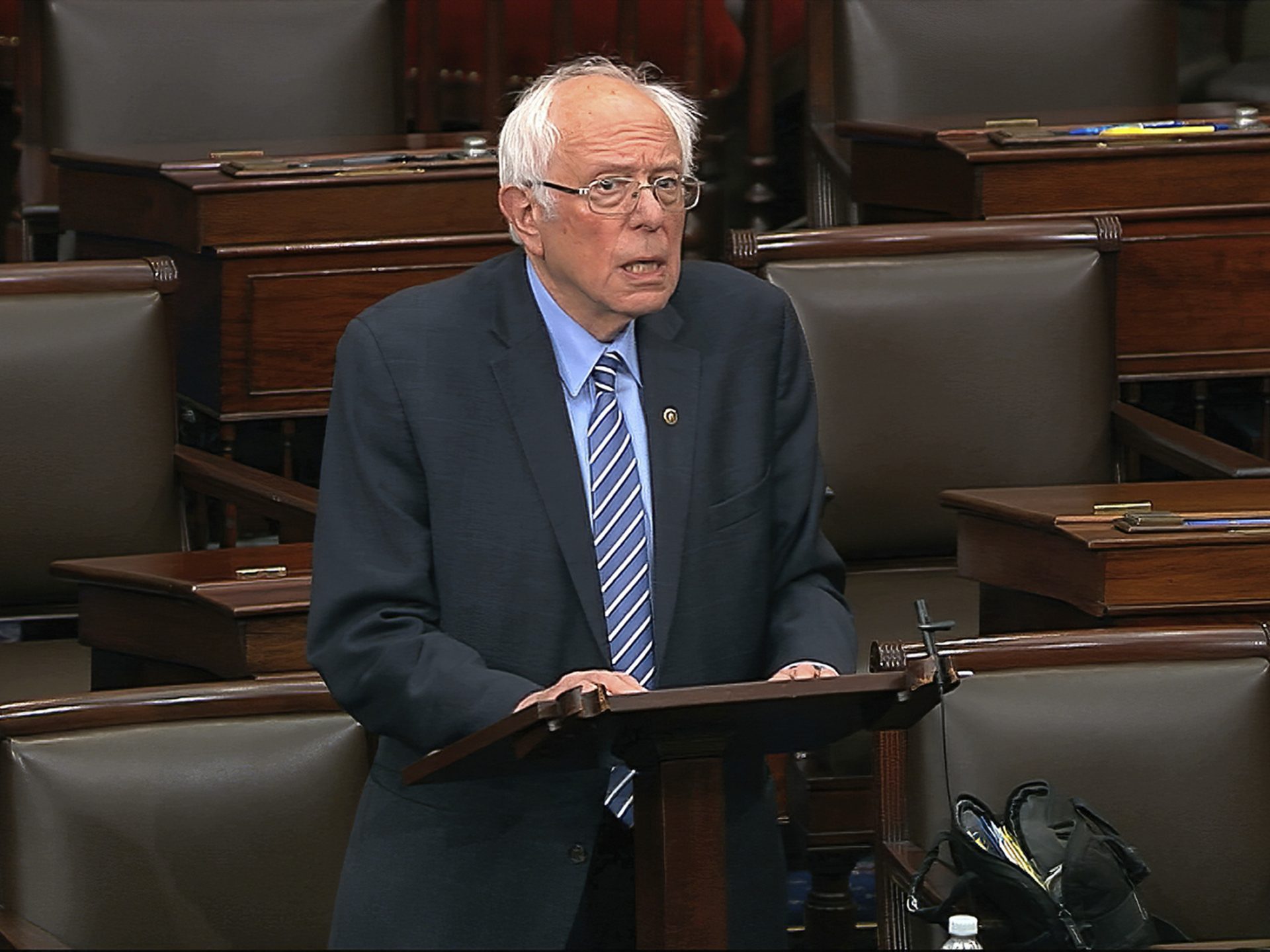
Senate Majority Leader Mitch McConnell, R-Ky., arrives to the U.S. Capitol on Friday when lawmakers faced a midnight deadline to pass a bill to fund the government.
Stefani Reynolds / Getty Images

Senate Majority Leader Mitch McConnell, R-Ky., arrives to the U.S. Capitol on Friday when lawmakers faced a midnight deadline to pass a bill to fund the government.
Stefani Reynolds / Getty Images

Stefani Reynolds / Getty Images
Senate Majority Leader Mitch McConnell, R-Ky., arrives to the U.S. Capitol on Friday when lawmakers faced a midnight deadline to pass a bill to fund the government.
(Washington) — After facing a series of delays, the Senate has approved by voice vote a one-week temporary funding measure to avert a government shutdown hours before a critical deadline.
The bill now heads to the president’s desk for his signature. Without it, federal agencies would run out of money at midnight Friday.
The move came as Sen. Bernie Sanders, the Vermont independent, relented on his demands to first hold a vote on a measure to allow direct payments to Americans.
“I am not one of the members of the Senate who shuts down, does this or does that and keeps people for weekends, I don’t do that,” Sanders said on the Senate floor ahead of the voice vote.
The effort de-escalates a highly dramatic scene raised in the Senate overnight, raising worries that a sequence of fights among various members could trigger a shutdown.
However, Sanders said he’ll raise his demands again when the stopgap measure, also known as a continuing resolution, is set to expire in one week. And he said Congress should not go home for the holidays without addressing coronavirus relief aid.
“I am prepared to withdraw my objection at this moment, but I will not be prepared to withdraw an objection next week,” Sanders said. “We will deal with the financial crisis facing tens of millions of Americans.”

Senate Television via AP
Sen. Bernie Sanders was pushing for a commitment to vote to include another round of stimulus checks in a coronavirus relief package before agreeing to move ahead on a one-week funding bill. He relented on those plans.
It was one of a series of efforts that delayed the Senate passing the legislation before Friday afternoon.
A group of Republican members were pushing for a provision to stop members of Congress from receiving pay during government shutdowns in the future.
Sen. Mike Braun of Indiana said he was among the GOP members seeking a vote on his “no budget, no pay” bill ahead of the vote on the stopgap measure. However, the measure was not addressed on the Senate floor before approval was given to the temporary funding measure.
“We’re going to try to vote something out,” Braun told a Capitol Hill pool reporter ahead of the voice vote.
The stopgap measure also met delays as the result of a traffic jam in the Senate.
The legislation was passed by a large majority in the House of Representatives on Wednesday. When it arrived to the Senate, it was stuck behind the National Defense Authorization Act that arrived to the Senate first.
That remained the case Friday.
“The Senate needs to pass a stopgap funding measure today to prevent a lapse while a bipartisan, bicameral effort closes in a full-year funding bill,” Senate Majority Leader Mitch McConnell, R-Ky., said in opening remarks Friday on the chamber floor.
Another key holdout, GOP Sen. Rand Paul of Kentucky on Friday withdrew his demands for the defense bill on Friday, saying he only wanted it held up for a day. That allowed an afternoon vote on the National Defense Authorization Act, clearing the way for the temporary funding measure, also known as the continuing resolution.
The defense bill passed by a vote of 84 to 13.
“Our main point in filibustering the defense authorization bill was to point out that the president should have the prerogative to end a war, not just to start wars,” Paul told a Capitol Hill reporter.
Soon after, lawmakers approved a procedural motion to allow a final vote on the defense bill. Trump has threatened to veto the measure, but overwhelmingly majorities in both chambers have signaled support for the plan.
With now the House and Senate approving the defense bill with a veto-proof majority, it appears Congress may have the votes to override a potential Trump veto.

A collection of interviews, photos, and music videos, featuring local musicians who have stopped by the WITF performance studio to share a little discussion and sound. Produced by WITF’s Joe Ulrich.
The days of journalism’s one-way street of simply producing stories for the public have long been over. Now, it’s time to find better ways to interact with you and ensure we meet your high standards of what a credible media organization should be.